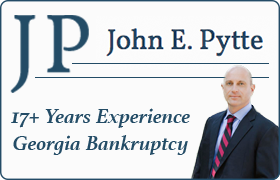Pooler Reorganization Lawyer, Georgia
Sponsored Law Firm
-
 x
x

Click For More Info:
-
John E. Pytte
617 Stevenson Ave Suite 102 Savannah, GA 31405 » view mapChapter 13, Chapter 7, Foreclosure Your Georgia Debt Relief Specialist
Bankruptcy has lost much of its once onerous meaning. The perception has changed largely because of the experience of thousands of people.
800-948-3470  John E. Pytte Savannah, GA
John E. Pytte Savannah, GAAttorney At Law - GA, 1995
University of Georgia School of Law
 Rebuild Credit
Rebuild CreditMost people choose to keep their personal property and just include the loan in their Chapter 13 plan.
Not enough matches for Pooler Reorganization lawyer.
Below are all Pooler Bankruptcy & Debt lawyers.
R. Brandon Galloway
✓ VERIFIEDR. Brandon Galloway is a practicing lawyer in the state of Georgia where he currently works at Galloway & Galloway, P.C. He received his bachelors deg... (more)


 John E. Pytte Savannah, GA
John E. Pytte Savannah, GA Rebuild Credit
Rebuild Credit

